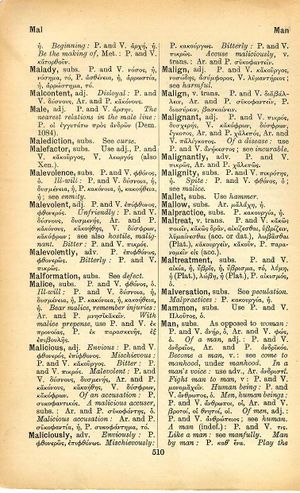malefactor: Difference between revisions
From LSJ
τὸ κακὸν δοκεῖν ποτ' ἐσθλὸν τῷδ' ἔμμεν' ὅτῳ φρένας θεὸς ἄγει πρὸς ἄταν → evil appears as good to him whose mind the god is leading to destruction (Sophocles, Antigone 622f.)
(D_5) |
(Gf-D_5) |
||
| Line 1: | Line 1: | ||
{{Woodhouse1 | {{Woodhouse1 | ||
|Text=[[File:woodhouse_510.jpg|thumb|link= | |Text=[[File:woodhouse_510.jpg|thumb | ||
|link={{filepath:woodhouse_510.jpg}}]]'''subs.''' | |||
Use adj., P. and V. [[κακοῦργος]], V. [[λεωργός]] (also Xen.). | Use adj., P. and V. [[κακοῦργος]], V. [[λεωργός]] (also Xen.). | ||
}} | }} | ||
Revision as of 07:38, 14 August 2017
English > Greek (Woodhouse)
subs.
Use adj., P. and V. κακοῦργος, V. λεωργός (also Xen.).
Latin > English (Lewis & Short)
mălĕfactor: ōris, m. id.,
I an evildoer, malefactor (Plautin. and post-class.): malefactorem amitti satiu'st quam relinqui beneficum, i. e. it is better to let a malefactor go unpunished than to be ungrateful towards a benefactor, Plaut. Bacch. 3, 2, 11: ad vindictam malefactorum, Vulg. 1 Pet. 2, 14.
Latin > French (Gaffiot 2016)
mălĕfactŏr,¹⁶ ōris, m., homme malfaisant, malfaiteur : Pl. Bacch. 395 ; Vulg. Joann. 18, 30.

